You also want an ePaper? Increase the reach of your titles
YUMPU automatically turns print PDFs into web optimized ePapers that Google loves.
Aussprache<br />
Please go to the Deutsch<br />
im Blick website, Kapitel 5<br />
Kapitel 5<br />
Aussprache<br />
Diphthongs and Triphthongs<br />
This chapter takes a closer look at sound- and letter-combinations in German involving vowels.<br />
Diphthongs, as the name suggests, consist of two vowels, while triphthongs consist of three vowels.<br />
1. Diphthongs<br />
A diphthong is a vocalic double sound. This means that one vowel “merges” with the other. The<br />
following are the three diphthongs in German: au, ei/ai, and eu/äu. On the chapter website, under<br />
„Aussprache”, you can click on the icon to hear the pronunciation of these words.<br />
Diphthong Phonetic<br />
Symbol<br />
COERLL - Germanic Studies - First Year German<br />
Examples<br />
au [aʊ] das Haus (house) die Maus (mouse) laufen (to run)<br />
ai/ei [aɪ] das Einzelkind<br />
(single child)<br />
eu/äu [ɔʏ] das Neujahr (New<br />
Year’s Eve)<br />
Freitag (Friday) im Mai (in May)<br />
deutsch du läufst (you run)<br />
There is one more diphthong that occurs pretty much in one interjection only: [ʊɪ] as in Pfui! (yuck!)<br />
Note the difference between the ie and the ei sequence! The former is pronounced like the ‘e’ in the<br />
English “even”, whereas the latter is pronounced like an “i”:<br />
ie ei<br />
lieben (to love) bleiben (to stay)<br />
die Geliebte (beloved) der Freitag (Friday)<br />
die Schwiegermutter (mother-in-law) schweigen (to stay quiet)<br />
das Genie (genius) langweilig (boring)<br />
das Bier heiraten (to marry)<br />
Point of interest: You may encounter some dialects in Germany, which have a few additional<br />
diphthongs than the German you have been learning in Deutsch im Blick. For example, High-<br />
Bavarian has two additional diphthongs: ua and oa.<br />
Diphthong Example from High-Bavarian<br />
ua Bua – “Bub” (boy)<br />
oa zwoa – “zwei” (two)<br />
Page 242 of 484 CC 2013 University of Texas at Austin


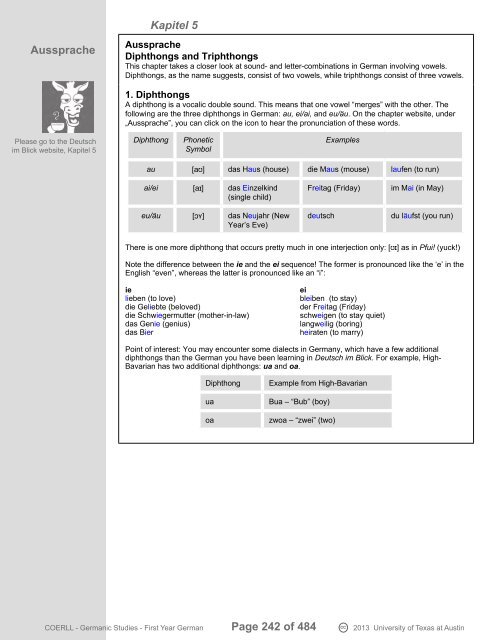
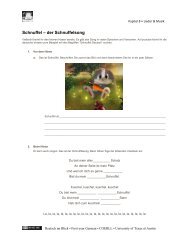
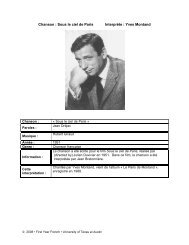
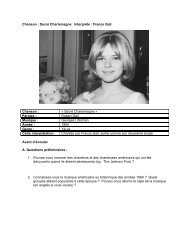


![con_02: negation [pdf]](https://img.yumpu.com/17488001/1/190x245/con-02-negation-pdf.jpg?quality=85)
![cas_04: telling time [pdf] - COERLL](https://img.yumpu.com/17487999/1/190x245/cas-04-telling-time-pdf-coerll.jpg?quality=85)
![v_04: separable prefix verbs [pdf]](https://img.yumpu.com/17487925/1/190x245/v-04-separable-prefix-verbs-pdf.jpg?quality=85)
![adj_01: adjectives overview, adjective endings [pdf]](https://img.yumpu.com/17487923/1/190x245/adj-01-adjectives-overview-adjective-endings-pdf.jpg?quality=85)
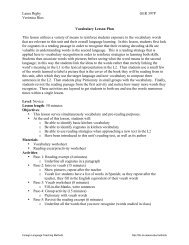
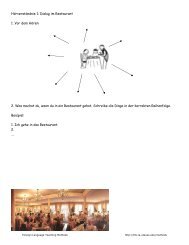
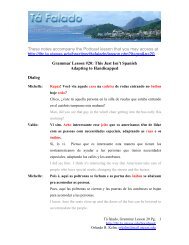
![vinf_01: infinitive constructions [pdf]](https://img.yumpu.com/17410532/1/190x245/vinf-01-infinitive-constructions-pdf.jpg?quality=85)
![cas_02: nominative case [pdf] - COERLL](https://img.yumpu.com/17410528/1/190x245/cas-02-nominative-case-pdf-coerll.jpg?quality=85)
![vi_09: schlafen [pdf] - COERLL](https://img.yumpu.com/17410520/1/190x245/vi-09-schlafen-pdf-coerll.jpg?quality=85)